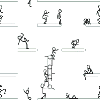| View previous topic :: View next topic |
| Author |
Message |
schminken

Joined: 06 May 2003
Posts: 109
Location: Austria (The Hills are Alive)
|
 Posted: Sat Jul 09, 2005 11:52 am Post subject: "whose" question Posted: Sat Jul 09, 2005 11:52 am Post subject: "whose" question |
 |
|
I'm getting a lot of different explainations in various grammar books about this so I'd like to know the definative answer.
A student of mine wants to write something like this on a presentation slide:
A new system was developed whose goal was to blablablalbalblablalbaba
Ok, whose is for people or things that are comprised of people like "The city whose football team has won 54385793 games this year."
but the problem is many people I know just say whose for objects anyway so it doesn't "sound wrong" to me. Is this completely wrong? Does he need to restructure the whole sentence? I want to be competely correct in what I tell him. |
|
| Back to top |
|
 |
Jyulee
Joined: 01 May 2005
Posts: 81
|
 Posted: Sat Jul 09, 2005 4:37 pm Post subject: Posted: Sat Jul 09, 2005 4:37 pm Post subject: |
 |
|
Descriptive vs Prescriptive grammar anybody? 
It sounds a bit weird to me.
For me, "whose" only works where the verb "possess" works, i.e.
The main possessed a great deal of money
("The man, whose money was...")
I wouldn�t say
"The system possesses a goal to ...."
It just doesn�t feel right. |
|
| Back to top |
|
 |
Henry_Cowell

Joined: 27 May 2005
Posts: 3352
Location: Berkeley
|
 Posted: Sat Jul 09, 2005 5:20 pm Post subject: Posted: Sat Jul 09, 2005 5:20 pm Post subject: |
 |
|
Avoid the problem entirely by teaching your students to simplify:
The newly developed system's goal was X.
The new system's goal was X.
Slides for presentations should have a BARE MINIMUM of text. The presenter supplies the missing information and words.  |
|
| Back to top |
|
 |
Chasgul
Joined: 04 May 2005
Posts: 168
Location: BG
|
 Posted: Sat Jul 09, 2005 6:40 pm Post subject: Posted: Sat Jul 09, 2005 6:40 pm Post subject: |
 |
|
I'd say 'whose' is correct as the goal 'of' the system was... Whose denotes possession and can be used where the simpler version is the possessive 's'.
Shoot me down if I'm wrong. Although I'd appreciate an explanation with a definite answer. |
|
| Back to top |
|
 |
dyak

Joined: 25 Jun 2003
Posts: 630
|
 Posted: Sun Jul 10, 2005 12:20 am Post subject: Posted: Sun Jul 10, 2005 12:20 am Post subject: |
 |
|
| Henry_Cowell wrote: |
Avoid the problem entirely by teaching your students to simplify:
The newly developed system's goal was X.
The new system's goal was X. |
I agree, the use of the passive in the OP's example isn't necessary unless he/she says something like, 'a new system was developed which will... blah blah blah...' or, 'a new system was developed, the goal of which is to blah blah blah...' |
|
| Back to top |
|
 |
darkhorse
Joined: 05 Jun 2005
Posts: 78
|
 Posted: Sun Jul 10, 2005 2:07 am Post subject: Posted: Sun Jul 10, 2005 2:07 am Post subject: |
 |
|
Good question.
P.S. It's "definitive." |
|
| Back to top |
|
 |
Chris_Crossley

Joined: 26 Jun 2004
Posts: 1797
Location: Still in the centre of Furnace City, PRC, after eight years!!!
|
 Posted: Sun Jul 10, 2005 3:49 am Post subject: "Whose" does not mean "who's" Posted: Sun Jul 10, 2005 3:49 am Post subject: "Whose" does not mean "who's" |
 |
|
I have seen some posters use the word, "whose", when they mean "who's", as in "who is" or "who has".
I don't doubt they know that they mean to use "who's", but sometimes people use the wrong spelling if only because it is the first one that comes into their mind as it is pronounced exactly the same as the word that they mean to type. |
|
| Back to top |
|
 |
Gregor

Joined: 06 Jan 2005
Posts: 842
Location: Jakarta, Indonesia
|
 Posted: Sun Jul 10, 2005 3:58 am Post subject: Posted: Sun Jul 10, 2005 3:58 am Post subject: |
 |
|
You wanted a definitive answer, so you came to DAVE'S FORUM???
OK. "Whose" in this context is not incorrect. It sounds strange to some people, yes, and perhaps it's better to recast the sentence - A new system was developed, and its goal is blahblahblah...
Is the compound sentence clumbsy? Does it feel like cheating? You want something more eloquent? OK, we can try, The goal of the recently developed (or whatever) system is blahblahblah...
I have no personal problem with using "whose" though, because there simply is no corresponding possessive pronoun for inanimate objects and so on. I think most people (and grammars!) these days would find "whose" unobjectionable in this case. |
|
| Back to top |
|
 |
Henry_Cowell

Joined: 27 May 2005
Posts: 3352
Location: Berkeley
|
 Posted: Sun Jul 10, 2005 4:54 am Post subject: Posted: Sun Jul 10, 2005 4:54 am Post subject: |
 |
|
From Patricia T. O'Conner, my favourite descriptivist:
Don't use whose to refer to inanimate objects.
Here's a musty old custom whose time is up. There's nothing wrong with using the possessive whose for inanimate objects: Never buy a car whose odometer doesn't work.
A related misconception is that you shouldn't use 's with inanimate things (as in This car's odometer is broken). Apparently, the thinking goes, inanimate things aren't as possessive as living ones. Silly, right? Well, this book's position is that yesterday's custom can be safely ignored.
[from Woe Is I] |
|
| Back to top |
|
 |
Henry_Cowell

Joined: 27 May 2005
Posts: 3352
Location: Berkeley
|
 Posted: Sun Jul 10, 2005 5:06 am Post subject: Posted: Sun Jul 10, 2005 5:06 am Post subject: |
 |
|
And a more scholarly explanation, from Webster's Dictionary of English Usage:
"Since English is not blessed with a genitive form for that or which, whose -- originally the genitive of what and who -- has been used to supply the missing forms since sometime in the 14th century.... In the last half of the 20th century we find the subject of whose and of which discussed in most of the current books; not one of them finds whose [for inanimate objects] anything but standard.... The notion that whose may not properly be used of anything except persons is a superstition. It has been used by inumerable standard authors from Wycliffe to Updike, and is entirely standard in all varieties of discourse...."
I could a tale unfold whose lightest word
Would harrow up thy soul.... [Shakespeare, Hamlet, 1601]
Of man's first disobedience, and the fruit
Of that forbidden tree, whose mortal taste
Brought death into the World... [Milton, Paradise Lost, 1667]
...Past and Future be the wings
On whose support harmoniously conjoined
Moves the great spirit of human knowledge.... [Wordsworth, The Prelude, 1805] |
|
| Back to top |
|
 |
Gregor

Joined: 06 Jan 2005
Posts: 842
Location: Jakarta, Indonesia
|
 Posted: Sun Jul 10, 2005 5:13 am Post subject: Posted: Sun Jul 10, 2005 5:13 am Post subject: |
 |
|
The "possessive 's" thing makes even less sense to me. In the English language, for some reason, people - even grammar authorities who should know better - fail to note the distinction between possessive and genetive. That is, showing possession is only one use of the genetive case, and there are many others.
From Wikipedia:
Specific varieties of genitive relationships include:
origin ("men of Rome")
composition ("wheel of cheese")
part of a mass ("a pound of beef")
number of distinct items (Old English "f�ower manna"; literally, "four of men")
relationship ("Janet's husband")
subjectivity ("my leaving")
objectivity ("the archduke's murder")
description ("man of honor", "day of reckoning")
inalienable possession ("my height", "his existence", "her long fingers")
alienable possession ("his jacket", "my drink")
The last two relationships are the most commonly expressed by the genitive.
Notice that of is also used to mark the genetive case. But it is far from only possession. There are other examples that come up quite often - a week's pay (the pay doesn't belong to the week, but rather is related to that week), or in three months' time, or ten years' experience. It just seems to me misleading to an extreme to insist on calling those "possessive" forms. Especially when most languages share this feature, and even expand on it in many cases (the Chinese, for one example, have no trouble whatsoever dealing with the concept of the genetive case...unless someone calls it "possessive" and insists that it IS such).
"Whose" is another example of this. It doesn't have to have anything at all to do with possession or ownership. THAT is the main source of the misconception, I think. |
|
| Back to top |
|
 |
Chasgul
Joined: 04 May 2005
Posts: 168
Location: BG
|
 Posted: Sun Jul 10, 2005 8:38 am Post subject: Posted: Sun Jul 10, 2005 8:38 am Post subject: |
 |
|
Unfortunately contemporary EFL mythology likes to advertise english as 'caseless' so comments involving words like accusative or genitive were consistently re-explained for me in other ways when I used them whilst on my CELTA course.  |
|
| Back to top |
|
 |
stillnosheep

Joined: 01 Mar 2004
Posts: 2068
Location: eslcafe
|
 Posted: Sun Jul 10, 2005 12:04 pm Post subject: Posted: Sun Jul 10, 2005 12:04 pm Post subject: |
 |
|
Henry: No disagreement about the acceptability of 'whose' as the genitive for 'which' but your earlier suggestions for alternative phrasings change the meaning of the sentence by emphasising the development of the new system, rather than it's purpose.
'A new system was developed to ...' would be more elegant and more accurately reflect the stress on the 'goals' of the system contained in the original sentence.
Grammatical explanations are tools developed to explain language and aid comprehension. They cannot perfectly map languages which were not developed according to prescriptive formula. |
|
| Back to top |
|
 |
moonraven
Joined: 24 Mar 2004
Posts: 3094
|
 Posted: Sun Jul 10, 2005 12:41 pm Post subject: Posted: Sun Jul 10, 2005 12:41 pm Post subject: |
 |
|
| Personally, I would never use "whose" to refer to something inanimate. I would use "of which". |
|
| Back to top |
|
 |
Henry_Cowell

Joined: 27 May 2005
Posts: 3352
Location: Berkeley
|
 Posted: Sun Jul 10, 2005 7:40 pm Post subject: Posted: Sun Jul 10, 2005 7:40 pm Post subject: |
 |
|
| stillnosheep wrote: |
Henry: No disagreement about the acceptability of 'whose' as the genitive for 'which' but your earlier suggestions for alternative phrasings change the meaning of the sentence by emphasising the development of the new system, rather than it's purpose.
'A new system was developed to ...' would be more elegant and more accurately reflect the stress on the 'goals' of the system contained in the original sentence. |
My rewordings of the original result in sentences that have the word goal as the subject. Can't get more 'stress on the goals' than that!  And my own goal was to produce something that is appropriate for a presentation slide, not for a thesis. And my own goal was to produce something that is appropriate for a presentation slide, not for a thesis.
Here's what the student should write on the slide:
Goal of new system: XYZ |
|
| Back to top |
|
 |
|

